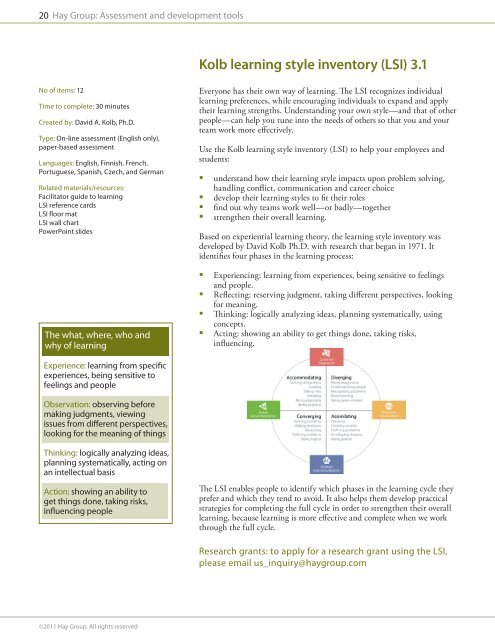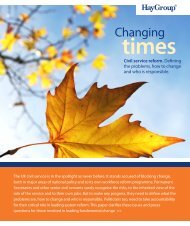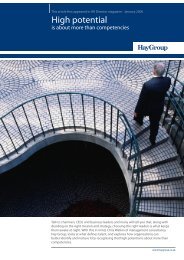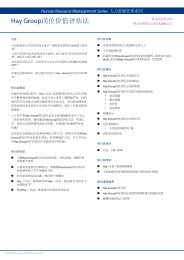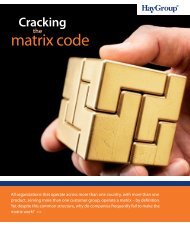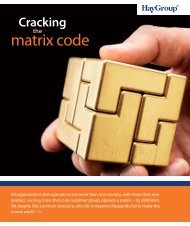Assessment and development tools - Hay Group
Assessment and development tools - Hay Group
Assessment and development tools - Hay Group
Create successful ePaper yourself
Turn your PDF publications into a flip-book with our unique Google optimized e-Paper software.
20 <strong>Hay</strong> <strong>Group</strong>: <strong>Assessment</strong> <strong>and</strong> <strong>development</strong> <strong>tools</strong><br />
Kolb learning style inventory (LSI) 3.1<br />
No of items: 12<br />
Time to complete: 30 minutes<br />
Created by: David A. Kolb, Ph.D.<br />
Type: On-line assessment (English only),<br />
paper-based assessment<br />
Languages: English, Finnish, French,<br />
Portuguese, Spanish, Czech, <strong>and</strong> German<br />
Related materials/resources:<br />
Facilitator guide to learning<br />
LSI reference cards<br />
LSI floor mat<br />
LSI wall chart<br />
PowerPoint slides<br />
The what, where, who <strong>and</strong><br />
why of learning<br />
Everyone has their own way of learning. The LSI recognizes individual<br />
learning preferences, while encouraging individuals to exp<strong>and</strong> <strong>and</strong> apply<br />
their learning strengths. Underst<strong>and</strong>ing your own style—<strong>and</strong> that of other<br />
people—can help you tune into the needs of others so that you <strong>and</strong> your<br />
team work more effectively.<br />
Use the Kolb learning style inventory (LSI) to help your employees <strong>and</strong><br />
students:<br />
• underst<strong>and</strong> how their learning style impacts upon problem solving,<br />
h<strong>and</strong>ling conflict, communication <strong>and</strong> career choice<br />
• develop their learning styles to fit their roles<br />
• find out why teams work well—or badly—together<br />
• strengthen their overall learning.<br />
Based on experiential learning theory, the learning style inventory was<br />
developed by David Kolb Ph.D. with research that began in 1971. It<br />
identifies four phases in the learning process:<br />
• Experiencing: learning from experiences, being sensitive to feelings<br />
<strong>and</strong> people.<br />
• Reflecting: reserving judgment, taking different perspectives, looking<br />
for meaning.<br />
• Thinking: logically analyzing ideas, planning systematically, using<br />
concepts.<br />
• Acting: showing an ability to get things done, taking risks,<br />
influencing.<br />
Experience: learning from specific<br />
experiences, being sensitive to<br />
feelings <strong>and</strong> people<br />
Observation: observing before<br />
making judgments, viewing<br />
issues from different perspectives,<br />
looking for the meaning of things<br />
Thinking: logically analyzing ideas,<br />
planning systematically, acting on<br />
an intellectual basis<br />
Action: showing an ability to<br />
get things done, taking risks,<br />
influencing people<br />
The LSI enables people to identify which phases in the learning cycle they<br />
prefer <strong>and</strong> which they tend to avoid. It also helps them develop practical<br />
strategies for completing the full cycle in order to strengthen their overall<br />
learning, because learning is more effective <strong>and</strong> complete when we work<br />
through the full cycle.<br />
Research grants: to apply for a research grant using the LSI,<br />
please email us_inquiry@haygroup.com<br />
©2011 <strong>Hay</strong> <strong>Group</strong>. All rights reserved


